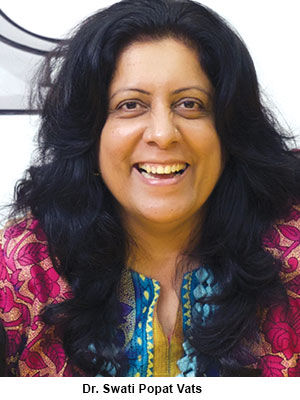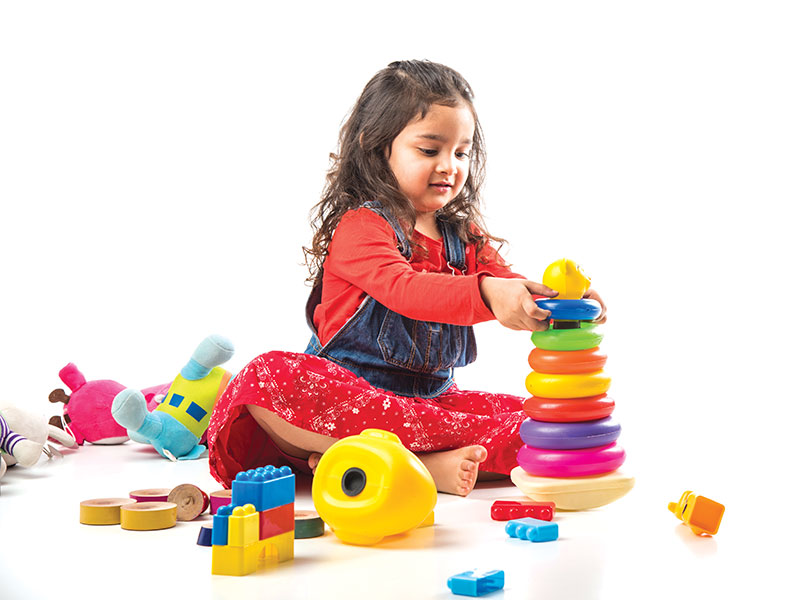 – Swati Popat Vats is president of the Early Childhood Association
– Swati Popat Vats is president of the Early Childhood Association
With Covid-19 infections continually spiking, parents are apprehensive about sending youngest children to school and are increasingly accepting the argument that early childhood care and education is dispensable. This is ill-advised because it has been proven beyond doubt that formal ECCE is the foundation of all education and future learning.
The global Covid-19 pandemic, which has forced closure of all education institutions including pre primaries in India since early March, has undermined the many years of hard work done by advocates of early childhood care and education (ECCE) especially the Early Childhood Association (ECA, estb. 2011) to impact the importance of ECCE upon parents and government.
With Covid-19 infections continually spiking, parents are apprehensive about sending youngest children to school and are increasingly accepting the argument that ECCE is dispensable. This is ill-advised because it has been proven beyond doubt that formal ECCE is the foundation of all education and future learning.
Many parents are asking the question: ‘Surely it doesn’t matter if children between the ages of 3-6 years miss a year of preschool?’ Well, it would mean a huge loss in terms of children’s cognitive, language and socio-emotional development.
Early childhood refers to the first six years of life. This is acknowledged as the most crucial period when the foundations are laid for lifelong learning and human development. Neuroscience research and evidence shows that over 85 percent of a child’s cumulative brain development happens prior to the age of six, indicating the critical importance of developmentally appropriate care and stimulation of the brain in the early years. During the ages 0-3 years, quality ECCE includes facilitating the health and nutrition of mother and child as also providing cognitive and emotional stimulation to infants through talking, playing, music and sounds, and stimulating the other senses, particularly sight and touch. Exposure to languages, numbers, and simple problem-solving is also important during this period.
 From 3-6 years of age, ECCE focuses on teaching children self-help skills (such as putting on clothes, shoes, etc), maintaining personal hygiene and cleanliness, coping with separation anxiety from parents, socialisation skills, and physical development through movement and exercise, expressing and communicating thoughts and feelings to parents and others. During these years, children learn the alphabet, languages, numbers, colours, shapes, drawing/ painting, indoor and outdoor play, and logical thinking.
From 3-6 years of age, ECCE focuses on teaching children self-help skills (such as putting on clothes, shoes, etc), maintaining personal hygiene and cleanliness, coping with separation anxiety from parents, socialisation skills, and physical development through movement and exercise, expressing and communicating thoughts and feelings to parents and others. During these years, children learn the alphabet, languages, numbers, colours, shapes, drawing/ painting, indoor and outdoor play, and logical thinking.
Therefore given the vital importance of ECCE in shaping a child’s future, it’s imperative that youngest children have access to a flexible, multifaceted, play, activity, discovery-based education, provided by trained ECCE teachers.
However because of prolonged closure of preschools triggered by the Covid-19 health emergency, children have lost over five months of learning. It’s entirely possible that many households may not send children to preschool once they reopen and prefer to wait for the discovery of a vaccine. But it’s important to bear in mind that long breaks from school result in substantial loss of learning (emotional, psychological, academic, physical, social and cognitive) for children.
To enable youngest children to receive learning stimulation from qualified early years’ educators, the Early Childhood Association has advised its 38,000 member preschools to conduct online video chat-based interactions with children to teach foundational concepts through stories and games. Around the world, pre-primaries and primarysecondary schools are using a blend of online and offline — asynchronous and synchronous models — to continue the education of children.
Communication with teachers, spending quality time interacting with peers, engaging in song-n-dance, story-telling sessions, etc are important to stimulate children’s intelligences during these hazardous times. Teachers can also use video interactions to convey important messages about hands washing, maintaining health and hygiene, importance of physical distancing, wearing masks and dispel fears and myths about the coronavirus.
Preschool in a box There are many preschool-in-a-box programmes which offer preschool curriculum programmes, learning kits and activities for children schooled at home. Even Preschools and anganwadis should use developmentally appropriate pedagogies to interact with young children online. Songs, stories, games, yoga, laughter, counting numbers, naming colours, learning the alphabet, etc — all this can be done in a mere one hour of ‘face-time’ on a video chat platform. These online teacher-child interactions could be supported by quality communication at home.
Fortunately several state governments such as Karnataka and Maharashtra which proscribed online learning for preschoolers have revoked these bans. Most of them have recommended a maximum of 30 minutes per session online with mandatory adult supervision in interactive mode, with play, story, and rhymes.
ECCE: Choose the best option
Parents are confused about whether to continue with online learning, use a preschool in a box programme, home school, call a teacher home/ or to your building, or to take a gap year.
Dr. Swati Popat Vats, president of the Early Childhood Association, explains the pros and cons of each option advising parents to make studied decisions bearing the safety and health of children in mind.
Home school
Most households are experiencing excessive stress due to job loss, prolonged work from home hours, salary cuts, delays etc. In such a scenario parents don’t have the time to plan and maintain a study/play schedule and most importantly the patience to plan age-appropriate activities that are beneficial to children’s holistic development.
Preschool in a box
There are many preschool-in-a-box programmes which offer preschool curriculum programmes, learning kits and activities for children schooled at home. Even under this alternative, it is parents again who will have to implement this programme. They need to carefully deliberate if they have the time, patience and understanding to deliver the curriculum.
Calling a teacher home or to your building?
Unsafe! The recent spike in Covid-19 cases shows that even one infected person can spread the virus. How will you safeguard the health of the teacher and other children if there are group classes?
What if children miss a year of preschool?
It’s a huge loss in terms of children’s cognitive, language and socio-emotional development.
Online engagements from trained ECE teachers.
ECA strongly recommends blended synchronous and asynchronous teacher-guided activities, face-to-face on a virtual platform to enable children to develop their language and thinking skills and interact with peers. This should be followed up with recommended home activities conducted by parents.
Also read: India’s unsung ECCE pioneers

























